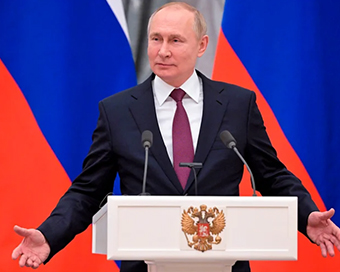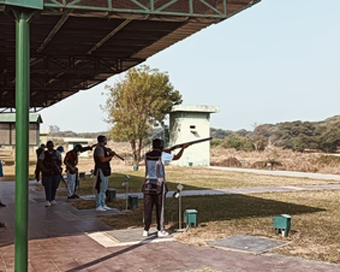Gallery
 PM Modi visit USA
PM Modi visit USA Only the mirror in my washroom and phone gallery see the crazy me : Sara Khan
Only the mirror in my washroom and phone gallery see the crazy me : Sara Khan Karnataka rain fury: Photos of flooded streets, uprooted trees
Karnataka rain fury: Photos of flooded streets, uprooted trees Cannes 2022: Deepika Padukone stuns at the French Riviera in Sabyasachi outfit
Cannes 2022: Deepika Padukone stuns at the French Riviera in Sabyasachi outfit Ranbir Kapoor And Alia Bhatt's Wedding Pics - Sealed With A Kiss
Ranbir Kapoor And Alia Bhatt's Wedding Pics - Sealed With A Kiss Oscars 2022: Every Academy Award Winner
Oscars 2022: Every Academy Award Winner Shane Warne (1969-2022): Australian cricket legend's life in pictures
Shane Warne (1969-2022): Australian cricket legend's life in pictures Photos: What Russia's invasion of Ukraine looks like on the ground
Photos: What Russia's invasion of Ukraine looks like on the ground Lata Mangeshkar (1929-2022): A pictorial tribute to the 'Nightingale of India'
Lata Mangeshkar (1929-2022): A pictorial tribute to the 'Nightingale of India' PM Modi unveils 216-feet tall Statue of Equality in Hyderabad (PHOTOS)
PM Modi unveils 216-feet tall Statue of Equality in Hyderabad (PHOTOS)India Open Competition in Shotgun, organised by the National Rifle Association of India (N
- Hockey India names Amir Ali-led 20-man team for Junior Asia Cup
- Harmanpreet Singh named FIH Player of the Year, PR Sreejesh gets best goalkeeper award
- World Boxing medallist Gaurav Bidhuri to flag off 'Delhi Against Drugs' movement on Nov 17
- U23 World Wrestling Championship: Chirag Chikkara wins gold as India end campaign with nine medals
- FIFA president Infantino confirms at least 9 African teams for the 2026 World Cup
How online disinformation campaign aided new war narrative for Russian President Vladimir Putin Last Updated : 25 Feb 2022 12:57:25 AM IST 
Russian President Vladimir Putin A well-prepared online disinformation campaign on various social media platforms changed the whole narrative around the escalated Russia-Ukraine tensions, aiding Russian President Vladimir Putin's decision to go to war over claims to protect the people "who have been suffering from abuse and genocide by the Ukrainian regime for eight years", reports said.
A report in France24 has detailed how days after the Kremlin slammed Western "hysteria" over the Russian military buildup around Ukraine, the messaging from Moscow changed, following Putin's decision to recognise the pro-Russian, self-declared republics of Donetsk and Luhansk in Eastern Ukraine.The disinformation posts were first circulated in pro-Russian groups mostly on the encrypted messaging service Telegram, and then relayed by the state and pro-Kremlin media organisations to the world."Over the past few days, Russian state media has insisted that Putin has ordered troops on a apeacekeeping' mission into eastern Ukraine to prevent what the Russian leader has called a agenocide' of Russian-speakers by the government in Kiev," the report mentioned.Some of the disinformation examples were a photo of an alleged Ukrainian armoured vehicle on Russian territory, a video of Ukrainian troops on an "invasion" mission infiltrating Russia, and another clip supposedly showing Ukrainian or Polish "saboteurs" trying to blow up Russian tanks.Fact-checkers have exposed such fake videos and images being posted by Russians on social media platforms."The video of soldiers 'speaking Polish' and trying to sabotage Russian tanks was dissected to reveal a montage of video and audio pieces," Eliot Higgins, founder of investigative site Bellingcat, was quoted as saying.Some of the footage was shot in early February, while editors added footage and sound from a video shot during a Finnish military exercise in 2010."The image of an alleged Ukrainian armored vehicle supposedly advancing into Russian territory was also promptly and effectively debunked," the report said.The Soviet-era vehicle in the photo does not belong to the Ukrainian arsenal, according to investigators at Oryx, an open-source platform.Another claim that a shell fired from Ukrainian territory destroyed a Russian outpost on the border was supported by video by the FSB, one of Russia's key intelligence services, according to the report.The Conflict Intelligence Team (CIT) analysed the video and found that the closest Ukrainian positions" are located more than 37 kilometres from the impact zone."We find this 'incident' to be yet another in a string of poorly staged pretexts for a possible operation against Ukraine," CIT said in a tweet.It's not the first time that Putin has used the term "genocide" in Ukraine's context."This is what he had already done in 2014 before launching the invasion of Crimea," Stefan Meister, a specialist in Russian security and disinformation at the German Council on Foreign Relations, was quoted as saying.IANS Moscow For Latest Updates Please-
Join us on
Follow us on








172.31.16.186







